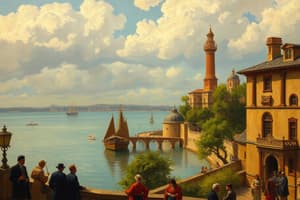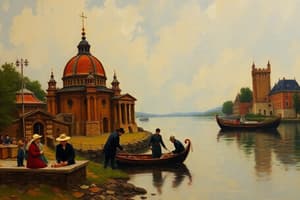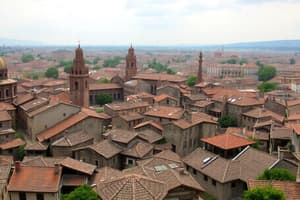Podcast
Questions and Answers
What is a civilization?
What is a civilization?
- A nomadic society
- A simple tribal community
- A complex culture where a large number of humans share common elements (correct)
- A group of isolated families
What are the six most important characteristics of a civilization?
What are the six most important characteristics of a civilization?
Cities, government, religion, social structure, writing, and arts and architecture.
Cities grew on ______ and bodies of water.
Cities grew on ______ and bodies of water.
rivers
What role does government play in a civilization?
What role does government play in a civilization?
Religion was not connected to the rulers in early civilizations.
Religion was not connected to the rulers in early civilizations.
How does social structure influence civilization?
How does social structure influence civilization?
What was the primary purpose of writing in early civilizations?
What was the primary purpose of writing in early civilizations?
Architecture was used to build temples for ______ or sacrifice.
Architecture was used to build temples for ______ or sacrifice.
What materials did artisans and farmers trade in early civilizations?
What materials did artisans and farmers trade in early civilizations?
Flashcards
What is a civilization?
What is a civilization?
A complex culture with shared traditions, institutions, and values among a large population.
What are the 6 key characteristics of a civilization?
What are the 6 key characteristics of a civilization?
Cities, government, religion, social structure, writing, and arts & architecture.
Why did cities grow near rivers?
Why did cities grow near rivers?
Rivers provided fertile land for farming and a source of water for drinking and transportation.
What is the role of government in a civilization?
What is the role of government in a civilization?
Signup and view all the flashcards
What is the role of religion in a civilization
What is the role of religion in a civilization
Signup and view all the flashcards
How does social structure influence civilization?
How does social structure influence civilization?
Signup and view all the flashcards
What was the main purpose of writing in early civilizations?
What was the main purpose of writing in early civilizations?
Signup and view all the flashcards
Why did early civilizations build temples?
Why did early civilizations build temples?
Signup and view all the flashcards
What did artisans and farmers trade in early civilizations?
What did artisans and farmers trade in early civilizations?
Signup and view all the flashcards
Study Notes
Characteristics of Civilizations
- Civilization Definition: A complex culture shared by large groups featuring essential characteristics such as cities, government, religion, social structure, writing, and arts and architecture.
Cities
- Development: Emerged near rivers and bodies of water for large-scale agriculture and fishing.
- Population Growth: Villages evolved into towns, which transformed into cities, fostering trade of surplus goods.
- Cultural Centers: Acted as hubs for population, culture, and economic trade.
Government
- Function: Organizes and regulates societal activities, ensuring order and interaction among people.
- Structure: Early governance typically led by monarchs who commanded armies and formulated laws to manage citizens' lives.
Religion
- Purpose: Offers explanations for natural forces and societal values, shaping understanding of existence.
- Connection to Authority: Rulers often claimed divine sanction for their power, intertwining religious and political authority.
Social Structure
- Framework: Establishes roles within society, comprising rulers and an elite class of priests and officials.
- Economic Activity: A large populace of farmers, artisans, and craftspeople supports the society through food production and crafts, creating trade networks for raw materials.
Writing
- Importance: Essential for maintaining historical records and managing significant affairs.
- Evolution: Expanded from record-keeping to include creative expression, leading to the development of literature.
Arts and Architecture
- Architecture: Structures built for worship, governance, and burial, including temples and royal tombs.
- Artistic Expression: Artists depicted narratives of nature, deities, and notable figures, enriching cultural heritage.
Studying That Suits You
Use AI to generate personalized quizzes and flashcards to suit your learning preferences.




